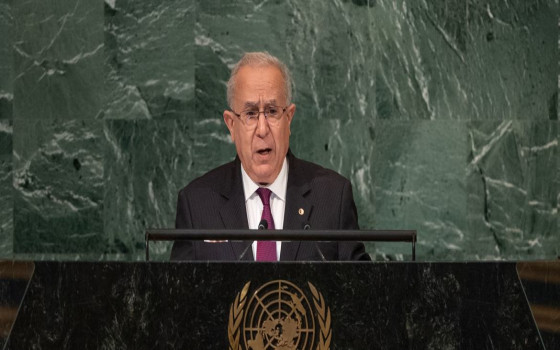
الديبلوماسي الجزائري لعمامرة مبعوثا شخصيا لامين عام الامم المتحدة الى السودان ..وتقرير اممي يتحدث عن ايام رعب في دارفور

- Europe and Arabs
- السبت , 18 نوفمبر 2023 14:15 م GMT
نيويورك ـ جنيف : اوروبا والعرب
عيـّن الأمين العام للأمم المتحدة، الدبلوماسي الجزائري رمضان لعمامرة مبعوثا شخصيا له إلى السودان. وأفاد المتحدث باسم الأمين العام باستلام خطاب من الحكومة السودانية أعلنت فيه قرارها بإنهاء عمل بعثة الأمم المتحدة السياسية (يونيتامس) في السودان.
وفي رده على سؤال في المؤتمر الصحفي اليومي قال المتحدث الأممي ستيفان دوجاريك إن مقر المبعوث الشخصي لن يكون في السودان.
وأكد دوجاريك أن الأمم المتحدة "ستواصل الانخراط، بشكل وثيق، مع كافة الجهات الفاعلة، بما في ذلك السلطات السودانية وأعضاء مجلس الأمن لتوضيح الخطوات المقبلة".
وقال إن مجلس الأمن هو الذي يعطي الأمين العام تفويض إدارة البعثات السياسية وبعثات حفظ السلام التابعة للأمم المتحدة.
الحكومة السودانية تطلب إنهاء مهام بعثة يونيتامس
وأكد ستيفان دوجاريك استلام الأمم المتحدة خطابا من الحكومة السودانية "يعلن قرار الحكومة إنهاء بعثة الأمم المتحدة المتكاملة لتقديم المساعدة في الفترة الانتقالية (يونيتامس) على الفور".
وقال ستيفان دوجاريك إن الحكومة السودانية "أعلنت أيضا التزامها بالانخراط بشكل بناء مع مجلس الأمن والأمانة العامة للأمم المتحدة بشأن صيغة جديدة متفق عليها".
وأشار دوجاريك إلى إعلان الأمين العام تعيين السيد إيان مارتن لقيادة عملية المراجعة الاستراتيجية لـبعثة يونيتامس بهدف تزويد مجلس الأمن بخيارات حول كيفية تكييف ولاية البعثة لتناسب السياق الحالي بشكل أفضل.
يشار إلى أن بعثة يونيتامس- وهي بعثة أممية سياسية خاصة- تأسست وفقا لقرار مجلس الأمن 2524، في حزيران/يونيو 2020. ومن المقرر أن ينتهي تفويضها في الثالث من كانون الأول/ديسمبر المقبل.
وفي نفس الملف ، أعربت مفوضية الأمم المتحدة السامية لحقوق الإنسان عن القلق البالغ إزاء التقارير التي تفيد بأن قوات الدعم السريع والميليشيات العربية المتحالفة معها قتلت مئات المدنيين من مجتمعات المساليت في بلدة أردمتا في وقت سابق من هذا الشهر.
يعد هذا الهجوم الجماعي الثاني بدوافع عرقية على المدنيين المساليت في غرب دارفور خلال بضعة أشهر فقط، بعد مقتل المئات من الرجال والنساء والأطفال المساليت - بما في ذلك والي غرب دارفور السابق، خميس عبد الله أبكر - في الفترة بين أيار/ مايو وحزيران/يونيو من هذا العام.
وفي مؤتمر صحفي عقد في جنيف امس الجمعة، قال المتحدث باسم المفوضية، جيريمي لورانس إن المعلومات الأولية التي تم الحصول عليها من الناجين والشهود تفيد بأن المدنيين المساليت "عانوا ستة أيام من الرعب على أيدي قوات الدعم السريع والميليشيات المتحالفة معها بعد سيطرتها على قاعدة للجيش السوداني في أردمتا في 4 تشرين الثاني /نوفمبر".
وقال إن بعض الضحايا "تم إعدامهم بإجراءات موجزة (بدون اتباع الإجراءات الواجبة) أو حرقهم أحياء"، وسط تقارير عن تعرض النساء والفتيات للعنف الجنسي، ونزوح آلاف الأشخاص، بعضهم عبر الحدود إلى تشاد.
وبحسب ما ورد، قامت قوات الدعم السريع والميليشيات المتحالفة معها بنهب الممتلكات، وتعذيب النازحين، وإعدام العديد منهم "قبل ترك جثثهم دون دفنها في الشوارع" في مخيمي أردمتا ودروتي للنازحين داخليا وحي الكبري.
وأضاف السيد لورانس أنه تم اعتقال مئات من الرجال الذين ما زال مصيرهم ومكان وجودهم مجهولا. وشدد المتحدث باسم المفوضية على أن مثل هذه الهجمات قد تشكل جرائم بموجب القانون الدولي.
وأشار أيضا إلى مزاعم خطيرة تفيد بتعرض بعض المدنيين العرب لهجمات انتقامية من قبل أفراد ميليشيات المساليت. ودعا إلى وقف جميع الانتهاكات على الفور وتقديم المسؤولين عنها إلى العدالة "بعد تحقيقات شاملة ومستقلة ومحايدة".
وكرر دعوة المفوض السامي لحقوق الإنسان، فولكر تورك، إلى قيادة قوات دعم السريع لإدانة ووقف عمليات القتل وغيرها من أعمال العنف وخطاب الكراهية التي تستهدف المدنيين على أساس عرقهم بشكل لا لبس فيه.
وقال: "وسط تقارير مثيرة للقلق عن هجوم وشيك لقوات الدعم السريع على الفاشر، عاصمة شمال دارفور، نذكرها وجميع أطراف النزاع الأخرى باحترام التزاماتها بموجب القانون الدولي الإنساني لضمان حماية المدنيين والبنية التحتية المدنية".












لا يوجد تعليقات